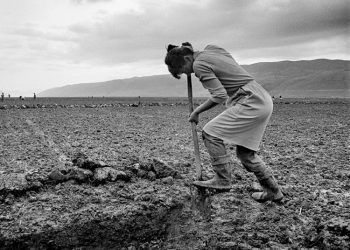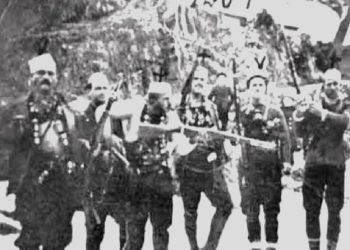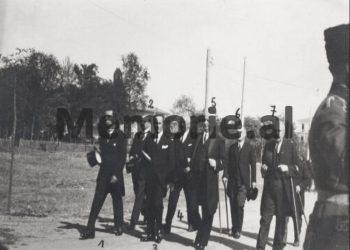By Eugen Shehu
Memorie.al / The debate that has been raging for years in the electronic and printed media of our motherland, Albania, regarding November 28-29, certainly cannot be without its place. Despite some ideas with crypto-communist origins, that; “both dates should be celebrated”, the debate essentially tries to reveal that the myths and false symbols of Albanians are now worth seeing for real, not to be hymned and hand-in-hand, if time requires, and to bring the mud of time to us, at least not to us, who remain outside the borders and around and around the motherland.
There are important historical moments when dates unite us, but there are also dates that sadden us, even throw us into the memory of pain and wounds, which continuously require sacrifices and healing, but here are the traces that are, unfortunately, deep, and one such date is that of November 29. A date that is inextricably linked to that of the bloodthirsty Yugoslav communists, and the half-century of suffering under that creature, we Albanians outside our mother country know best, so this debate necessarily draws us into its depths.
False nostalgia
To more realistically explain to the Albanian reader, it is worth considering the fact that with the advent of democracy in the mother country (political Albania), in the early 90s of the last century, the attributes of the first Albanian state were rightfully assigned to the government of Vlora, under the leadership of Ismail Qemali, and even the date December 4, 1912, the first day of work of this government, has entered the annals of Albanian history as the day of the founding of the Albanian state.
Of course, in this complete review of history and, moreover, of its symbols, not only the democratic government of that time was engaged, but also political scientists, researchers, historians, journalists, and deputies, and a series of incontestable evidence was presented, regarding the creation and functioning of the first Albanian state. The only ones who opposed this act, in the years 1992-1993, were a bunch of nostalgic old men of the evil past, who to this day keep in the closets of their houses, the decorations or orders of liberation, with the symbols of the sickle and hammer, borrowed from Moscow and Belgrade.
Up to this point, everything went well, but, with the coming to power of the Albanian Bolsheviks, in 1997, with the help of Belgrade, Athens and the throats of the “Kalashnikovs”, the vanguard of nostalgic old men, as if came to life. In the years that followed, the manipulated institutions of the mother state, under the suppression and poisonous ideological drift, did everything possible to ensure that the false myth of November 29, the victory of the communists, “re-emerged” through all kinds of anti-Albanian activities, overlooking or leaving in complete oblivion, not only such culminating events, such as the raising of the flag in Vlora, the Albanian League of Prizren, the formation of the first Albanian state, but also a series of prominent figures, organically connected with the epochal events of our nation.
As for other events or dates, which are related to ethnic Albanians in Montenegro, Kosovo, Illyria or Chameria, not a word was said in these years. On these events and prominent men, who did not even spare their lives for our ethnic lands, only bitterness and darkness have been poured out intentionally, fatally and institutionally. Meanwhile, the approaching holiday of November 28-29 seems to have revived the riverbed of “Alla-Albanian” debates. The first to launch the offensive were the Bolshevik vanguard, which threatened a referendum if November 29 was not a national holiday for all Albanians.
Behind them, politicians who climb the steps of the Albanian Parliament, with the votes of 70-80 year olds who are confused, are trying to keep the bloody symbols standing, just for the sake of the chair, without cracking their heads, what lies behind those myths, which they devised and kept standing, one of the most savage and bloody totalitarian dictatorships in all of Eastern Europe. What is worse, televisions that have received licenses in Tirana as national public televisions, are blowing the trumpets of Slavic melodies, regarding the problem in question.
So, at these moments, I see it appropriate to clarify some conjectures and doubts which, whether we like it or not, are related to such myths that for 5-6 decades in a row, have served not only as an exciting emotion for Albanians, but also as a reference point, from which numerous social – political and ethnological processes have taken their course and developed. It is already known that the Second World War divided Albanians into two camps. The first camp, that of the nationalists, was the democratic and nationalist current, which included the most prominent men of Albania, inside and outside the political borders, in April 1939, when the invasion of our country by fascist Italy became a fait accompli.
The visions that included the leadership of this camp were undoubtedly Western, due to the fact that these, not only had studied and lived in Italy, Austria, America, France, Germany, etc., but also that they made up the richest part of Albanian families. In other words, these were suckers of large Albanian families, in the 19th-20th centuries, which constituted the core of our national consciousness. While the camp of other Albanians (without wanting to offend them at all), not only did they not make up the group of large families, but the worst thing was that they were influenced by communist ideology, imported from the Slavs, with their diabolical backgrounds.
I say the worst because, for these to fight against the occupier, would be an ideal example, but for them to then rush to suppress and eliminate, all the values that large families carry, this was a tragedy. And this tragedy did not delay. At the end of November 1944, the partisan ranks allowed the German army to leave Albania in peace, while they did not delay in organizing Bolshevik-type punitive expeditions against the ‘bourgeoisie’, in other words, the large Albanian families, and even against nationalist military formations, such as those of the ‘Ball Kombëtar’, the ‘Second League of Prizren’ (later the NDSH), and all this was done in close cooperation with the Serbo-Slav partisans and Chetniks.
And as a result of these punishments against the “reactionaries”, it was so bloody that it lasted until the subjugation of Kosovo and other ethnic Albanian areas under the former Titoist Yugoslavia. This caused that in the 45 years of the communist dictatorship, a part of Albanians, those who were considered “victors”, saw November 29 as the greatest national symbol, while the other part, the one who was raped in prisons and terrible labor camps, saw it as a disaster, from which they sought to escape an hour ago. This handicap in the relations of Albanians among themselves, not only could not serve as a joyful celebration, but further, the shoe nails in military parades, the frenetic applause in communist plenums, opened new wounds in the historical consciousness of Albanians.
Betrayal of November 28!
In the conditions of today’s debate, I would remind readers that; it is worth dwelling on essential, doctrinal things and not on the memories of veterans and even worse, documents fabricated for 50 years in a row, in the basements of scuttlebutts and ideologized archives. Thus, it is now accepted by all of us that the Albanian communist leadership served the interests of Belgrade with the greatest political servility. The Yugoslav advisors in the leadership of the Tirana communists were such in name only, since most of the time they directed all the actions, actions and even more so the strategy of the leadership.
In order not to dwell on this issue, it is enough to mention the fact that; in the archives of the Albanian state, there are, among others, the words of Sejfulla Malëshova, a senior leader of the Albanian communists, who emphasizes, among other things, that; “Miladin Popovic was the main leader of the Albanian Communist Party. The Congress of Përmet, as well as the creation of the Antifascist National Liberation Council, were carried out by him, since our Party: neither the Central Committee, understood the congress”. (Central State Archives – Tirana. Fund 14, Ap.)
So, not only the creation of the General Staff, but also other mechanisms and events of the Albanian communists, up to the Congress of Përmet, the one that finally sealed the direction of Albania towards the Slavic peoples, bear the Slavic-Orthodox stamp. Without wanting to go into details and other documents, I think I will bring in these ranks, an order of Enver Hoxha, dated November 19, 1944 and which is found today, in the file of documents of the General Staff.
Among other things, it is stated here verbatim: “The government will enter Tirana on November 28. The city must be secured and the truly suspicious elements arrested. The party and other organizations must be mobilized to secure the city, especially the youth. The city must be cleared of signs of war, the streets must be open. Housing and food must be provided for the government, the council, the state, the youth, women and all their personnel, about 250 people, in addition to the 300 people of the Headquarters battalion.
Offices must be arranged. Delegations of 10-15 people must be called for November 28, from Durrës, Kavaja, Shijak, Elbasan, Peqin, Shkodra, Kruja, Peza, the provinces of Peshkopia and Kukës. For the South, we announce. Delegates must be called from the villages near Tirana. To ensure bread in general in the city and especially for November 28, so that there are no disorders on that day.
To organize a big parade for November 28, with Brigade I, IV, VIII, XV. If any of these are far away, to be replaced. To organize big manifestations for this day, where the whole people will participate in an organized manner. To give instructions to other organizations of Central and Northern Albania for this celebration. The arrival of the government, to be kept secret. Enver”!
On November 28, 1944, the communist government entered Tirana triumphantly, cheered by the numerous villagers who had come from the surroundings, as Commander Enver gave special orders. In his speech, among other things, he baptized November 28, as the day of liberation and always according to him, this day would be remembered full of glory by the Albanians. Also, this day was announced not only by the press of Tirana, but also by the press in Shkodra and elsewhere. The Albanian archives still preserve today the voice of the announcer of Radio Moscow, who congratulated the Albanian people on November 28, in the name of General Stalin.
But why did the Albanian clock have to be moved forward 24 hours?
Although the Germans had left Albania, although the Albanians had returned to normal life, now Tirana had to pay the debts of the government to Belgrade. There were thousands of volunteers from the mother country who were sent to fight against the Germans, alongside their Yugoslav brothers, while the “brothers” themselves were wreaking havoc on innocent Albanians in the areas of Kosovo and Albanian Macedonia.
The leadership of the Albanian communist clique, through the emissaries of Belgrade, was preparing to become an appendage of the Slavs, to carry out to the end, every adventure of theirs against our people. Every day, in Belgrade and Tirana, in addition to all kinds of relations, the idea was being structured that; the mother state, that is, the truncated Albania, could also be a separate Republic, within the Federal Republic of Yugoslavia.
Precisely for this, not only institutional issues but also symbols or myths had to be synchronized. Thus, on May 22, 1945, the Presidency of the Antifascist National Liberation Council, self-proclaimed as a Presidency, would make the decision on the proclamation of new national holidays, where surprisingly, the date of November 28, 1944 would be removed altogether. Thus, in the Official Gazette of June 16, 1945, among other things, we read:
Decision No. 73
On the declaration of official holidays.
The Presidency of the Antifascist National Liberation Council
The Presidency of the Antifascist National Liberation Council at its meeting on May 22, 1945 decided: To declare official holidays:
- September 16 – anniversary of the Peza Conference.
- July 10 – Army Day, anniversary of the formation of the General Staff of the National Liberation Army.
- May 24 – anniversary of the Përmet Congress.
Tirana, May 22, 1945.
To the Presidency of the Antifascist National Liberation Council,
Secretary; Koço Tashko, Chairman; Omer Nishani
Meanwhile, on November 29, 1943, the second meeting of AVNOJ was held in the former Yugoslavia, and preparations were being made for the proclamation of the Yugoslav People’s Federal Republic by the country’s People’s Assembly on November 29, 1945. Therefore, in order to synchronize the decisions, the Tirana leadership did not ask much, neither about what he had said a few months earlier, nor about what kind of friendship he was forging with the Slavs, these centuries-old enemies of the Albanian lands. What happened next, with the war bulletins, with the documents of the Communist Party or the General National Liberation Headquarters of Albania, were only ideological and perverse speculations.
Without entering into useless discussions and debates, without dealing with the fact that when the last German soldier left Albanian lands (because it must first be assessed what kind of conqueror he was for our nation), I see the “fire” burning in this debate even deeper. The fratricidal war of the Albanians during the years of World War II requires deeper enlightenment, beyond ideological resentments and fanaticisms. Neither side can remain hostage to the other side, and even more so, to the Albanian quasi-historians who continue to babble even today, without using the force of fact.
Today’s Albanian society is worth separating itself from the Slavic communist mindsets, not simply to be included in the processes within Albania, for brotherhood and national unity, but also to disinfect the nation once and for all, from this Slavic “virus”. War veterans, honest partisans, must distance themselves from November 29, because they have not and will not be connected to Belgrade, they cannot be held responsible for their former leaders.
These myths must be denounced and judged deeply by Albanian scholars and historians, who honestly work for the good of the Albanian nation and homeland. Thousands are still hanging today, the remains of our nation’s martyrs, who sacrificed themselves for the liberation of the country and the freedom of the nation, precisely from the betrayals of the past. Therefore, November 29 remains in the garbage dump of the past. /Memorie.al





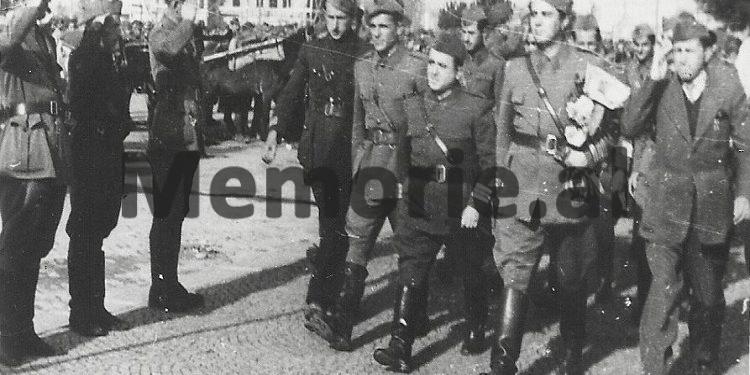
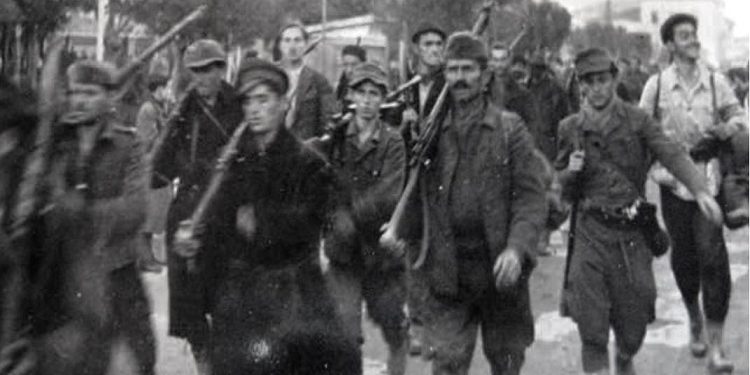
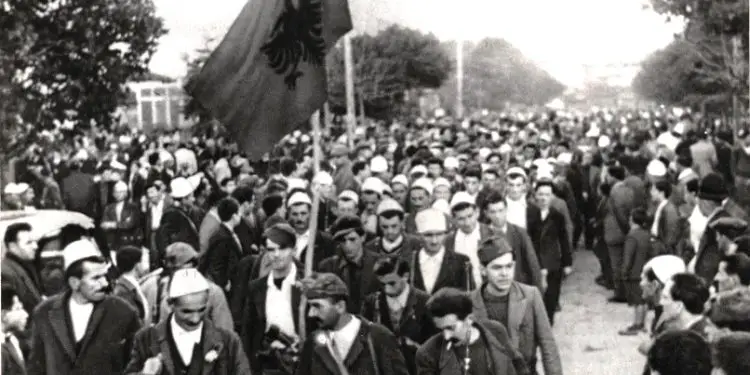
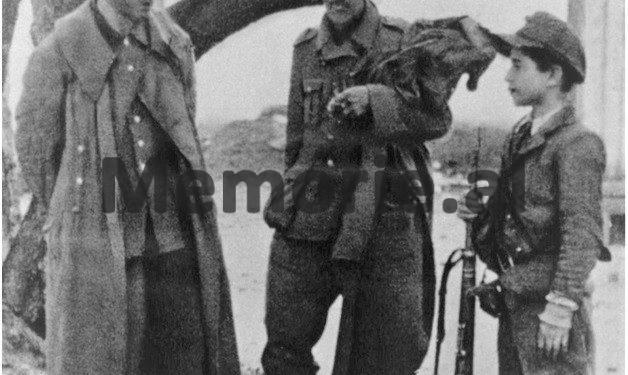
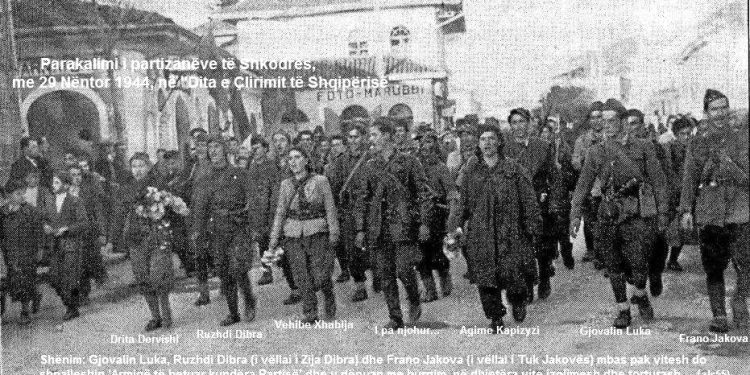
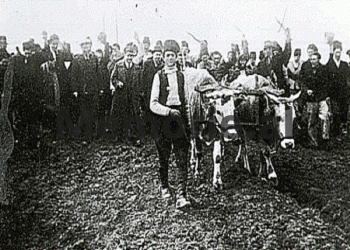
![“They have given her [the permission], but if possible, they should revoke it, as I believe it shouldn’t have been granted. I don’t know what she’s up to now…” / Enver Hoxha’s letter uncovered regarding a martyr’s mother seeking to visit Turkey.](https://memorie.al/wp-content/uploads/2026/01/Dok-1-350x250.jpg)

